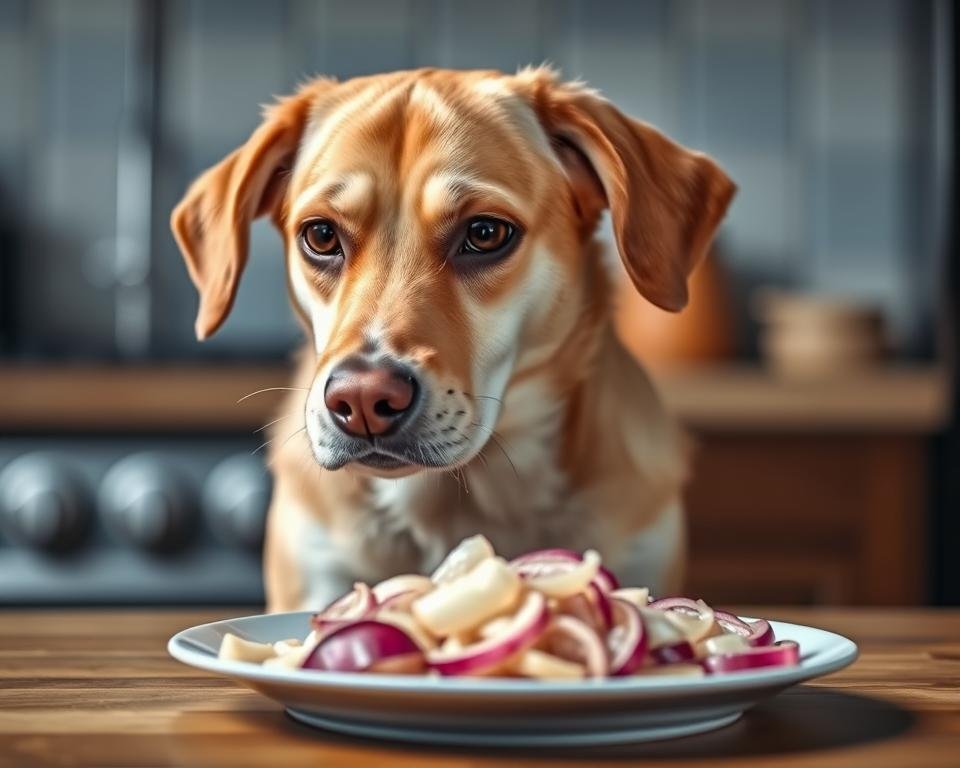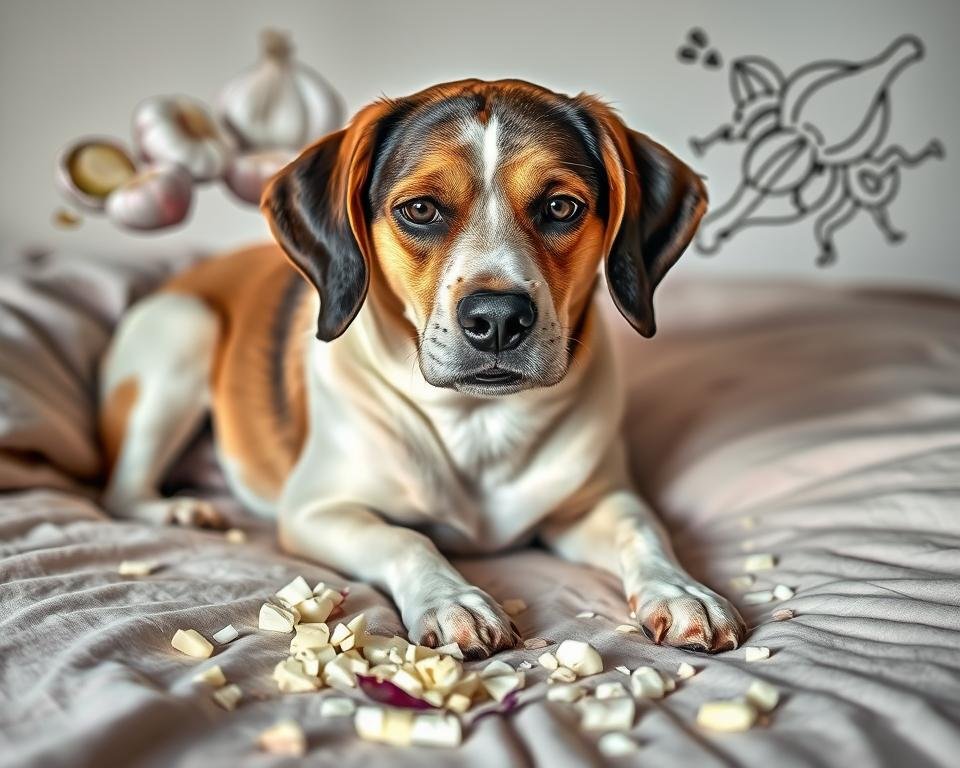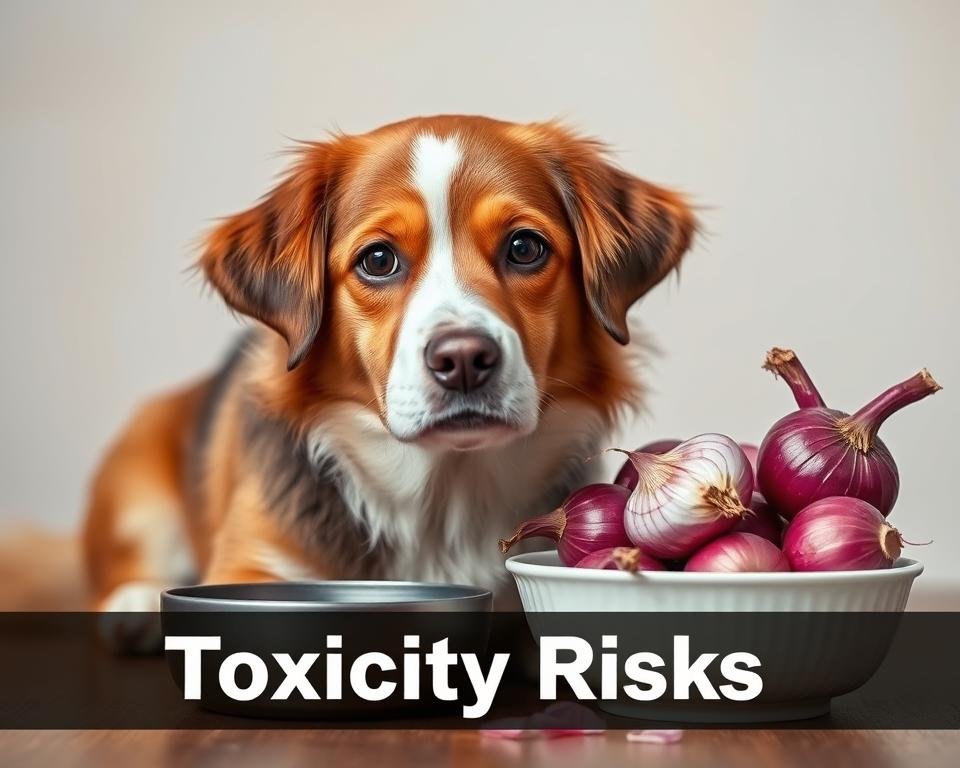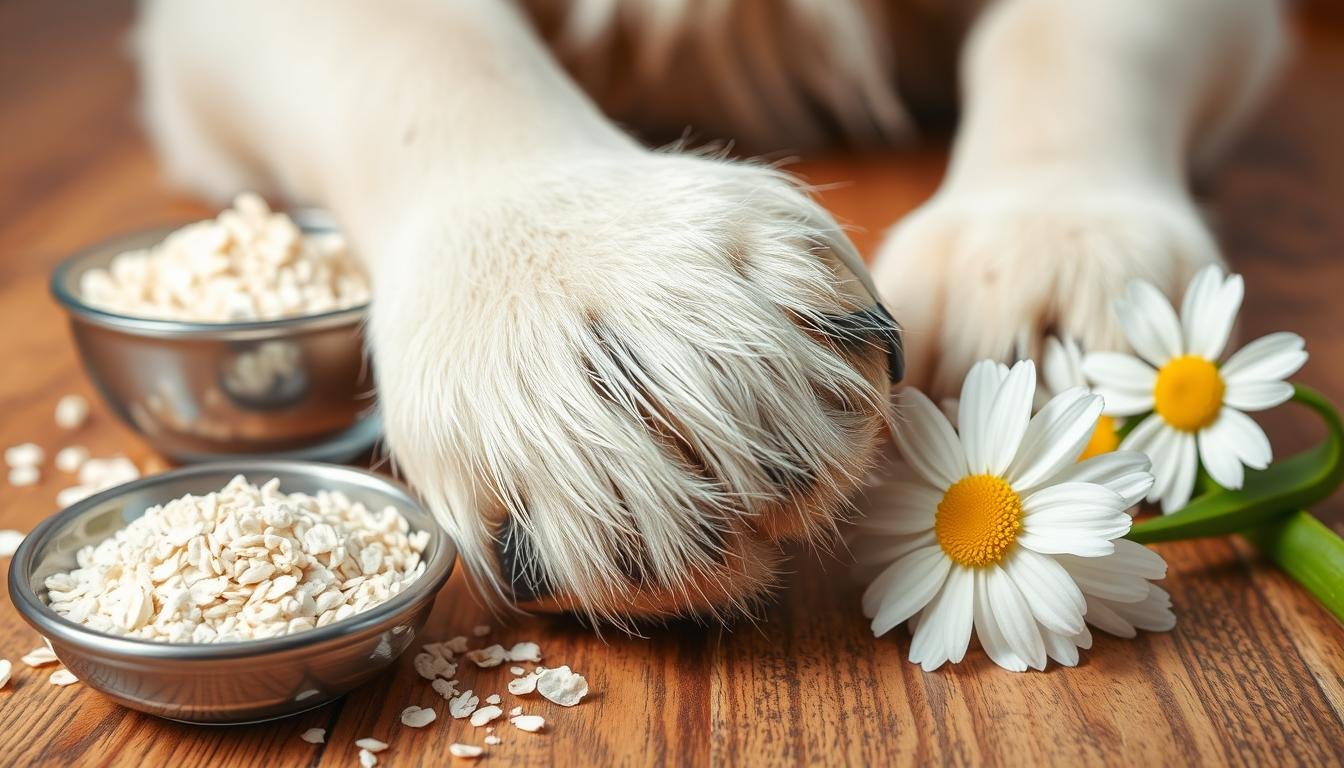It’s important for pet owners to know the dangers of onions for dogs. The question “can dogs eat onions” reveals a serious health risk. Onions, garlic, chives, and leeks are toxic to dogs, whether raw or cooked. Eating onions can cause serious health problems and even death.
Onion poisoning happens when dogs eat more than 0.5% of their body weight in onions. For example, a 40-pound dog eating just 0.2 pounds of onions is at risk. Dogs can’t digest onions and other allium vegetables, leading to problems like hemolytic anemia, where red blood cells are destroyed.
Symptoms of onion toxicity in dogs can show up a day or more after eating onions. They might include feeling tired, stomach pain, vomiting, diarrhea, and trouble walking. Severe cases can be deadly, so getting vet care quickly is key. To keep pets safe, make sure they can’t get to onions, including fresh, cooked, or processed ones.
Introduction to Onion Toxicity in Dogs
It’s important to know the dangers onions pose to dogs. Onions, garlic, and leeks are toxic to dogs and cats. They contain harmful compounds that can damage red blood cells, causing hemolytic anemia.

Symptoms of onion poisoning in dogs can start within 24 hours. But they often show up a few days after eating onions. Look out for vomiting, diarrhea, and a decrease in appetite. Even a small amount can be dangerous for dogs.
Different forms of onions, like fresh, dry, powdered, or cooked, are all risky. Here’s how each type can affect your dog:
| Type of Onion | Toxicity Level |
|---|---|
| Fresh Onion | High |
| Dry Onion | High |
| Onion Powder | Very High |
| Cooked Onion | High |
The dangers of onion toxicity are real. Once a dog eats onions, symptoms can appear. These include anemia, trouble breathing, and lethargy, which can happen 1-5 days later. Spotting these signs early and getting vet help quickly is key to your dog’s recovery.
In short, onions are harmful to dogs. It’s vital to recognize the signs of onion poisoning early. Keep onions, garlic, and other alliums away from your pet to keep them safe.
Why Are Onions Toxic to Dogs?
Onions are toxic to dogs because of certain chemicals. These chemicals, found in onions and other Allium family members, cause damage to red blood cells. This damage leads to anemia, which can be deadly.
Compounds Responsible for Toxicity
Onions contain sulfur compounds called thiosulfates. N-propyl disulfide is a key part of these compounds. Dogs can’t break down these toxins, making them very susceptible to harm.
Cooking onions doesn’t make them safer for dogs. Raw, cooked, or powdered, onions are all risky. Even small amounts, like garlic powder, can be dangerous.
Mechanism of Toxicity
Onions harm dogs by destroying red blood cells. This is because of N-propyl disulfide. It causes red blood cells to break down too early.
Dogs can show signs of onion poisoning through blood tests. If a dog looks tired or has red urine, get help fast. Even a small amount of onion can be very harmful.
In summary, onions are very dangerous for dogs. The toxins in onions are strong and can harm dogs a lot. Keeping dogs away from onions is very important.
| Toxin | Effect on Dogs | Toxic Dose |
|---|---|---|
| N-propyl disulfide | Oxidative damage to red blood cells | 0.5% of body weight in one sitting |
| Thiosulfates | Causes hemolysis | Approx. 0.22lb of onion per 44lb of dog |
Can Dogs Eat Onions?
Is onion bad for dogs? Yes, it is. Dogs should not eat onions, whether fresh, dried, or powdered. Eating onions can cause serious health problems. Even a little bit can be harmful, depending on the dog’s size and health.
Onions are toxic to dogs because they contain harmful compounds. The American Kennel Club says 100g of onion per 20kg of dog weight can be toxic. Symptoms include decreased appetite, pale gums, and weakness.
These symptoms can appear in a day or take several days to show up. They include a red tinge in the urine, vomiting, and diarrhea.
But onions aren’t the only danger. If you’re wondering, can dogs eat onions and garlic, the answer is no. Onions, garlic, chives, and leeks are all dangerous for dogs because they belong to the Allium family.
In severe cases, dogs may need urgent vet care. This could include treatments like activated charcoal, oxygen, or blood transfusions. Never try to make your dog vomit without a vet’s advice. It could make things worse.
If you think “my dog ate onions,” act fast. If your dog shows onion toxicity symptoms, see a vet right away.
Preventing problems is key. Keep onions away from your dog. Don’t give them food with onions. Always check the ingredients of human food before sharing it with your dog.
Healthy treats for dogs include carrots, cucumbers, and green beans. Remember, onions are definitely bad for dogs. Keeping them away is important for their health.
Symptoms of Onion Poisoning in Dogs
It’s important to spot the early signs of onion poisoning in dogs quickly. This is because symptoms can show up in just 24 hours. If not treated, these symptoms can get worse over time.

Immediate Symptoms
The first signs of onion poisoning in dogs include:
- Vomiting
- Diarrhea
- Abdominal pain
- Decreased appetite
- Lethargy
- Panting
- Elevated heart rate
- Pale gums
- Reddish urine
Long-term Consequences
Onion poisoning can cause serious health problems in dogs. These can include hemolytic anemia and damage to organs. The symptoms can get worse over a few days, leading to weakness and fainting.
Dog owners need to watch what their pets eat. Even a little onion, like in onion powders, can be harmful. A compound in onions can damage red blood cells, causing anemia. This is a big problem for certain breeds like Akitas and Shiba Inus.
How Much Onion is Toxic to Dogs?
Many pet owners don’t know that onions can be very dangerous for their dogs. It’s important to know how much onion is toxic to dogs to keep them safe. Every part of an onion, like its juice, leaves, and powder, can be harmful. But how much onion can really harm your dog?
Toxic Dose Calculation
The weight of the dog is key in figuring out the toxic dose of onions. Eating more than 0.5% of their body weight in onions can be bad. For example, a 20 kg dog might get sick from about 100 grams of onion. A 45-pound dog could get poisoned from just one big onion.
Onions can damage a dog’s red blood cells, leading to anemia or worse. It’s important to watch how much onion your dog eats, whether it’s raw, cooked, or powdered. Signs of onion poisoning might take 3 to 5 days to show up, so acting fast is key.
To make it clearer, here are some examples:
| Dog’s Weight | Onion Amount (grams) | Potential Risk |
|---|---|---|
| 10 kg | 50 g | High |
| 20 kg | 100 g | Severe |
| 45 lbs (20.4 kg) | 1 medium onion | Critical |
When it comes to onions and dogs, it’s better to be safe than sorry. If your dog eats onions, call your vet or the Pet Poison Helpline at (888) 426-4435 right away. Quick action can help avoid serious health issues and help your dog get better. For more details on toxic doses for your dog’s weight, check out this link.
What to Do If Your Dog Eats Onions
If your dog ate onions, you might wonder what to do. Onion toxicity in dogs is serious and needs quick action. Acting fast can help your dog recover better. Here’s how to handle dog onion poisoning emergencies.
Emergency Measures
Act quickly if your dog eats onions. Make sure they don’t eat more onions. If it happened recently, try to make them vomit. But, always check with your vet before using hydrogen peroxide at home.
- Induce Vomiting: Use 3% hydrogen peroxide as your vet advises. The usual dose is 1 teaspoon for every 10 pounds of your dog’s weight.
- Activated Charcoal: After vomiting, give activated charcoal to absorb stomach toxins.
- Seek Immediate Veterinary Care: Even if you’ve made them vomit, see a vet fast. Onion poisoning can cause serious issues like anemia and lethargy.
When to See the Vet
If your dog shows onion poisoning signs, see a vet right away. Look for symptoms like vomiting, diarrhea, and weakness.
- Vomiting and diarrhea
- Abdominal pain and excessive drooling
- Weakness, lethargy, and disinterest in food
- Labored breathing and increased heart rate
- Pale gums and discolored urine
Your vet will do blood tests and might give supportive treatments. Knowing what to do and acting fast can save your dog’s life. Always keep onions and toxic foods away from your dog.
Prevention is key. Keep onions and toxic foods out of your dog’s reach. This ensures their safety and well-being.
Treatment Options for Onion Poisoning
Acting fast is key when a dog eats onions. The first steps are to get the toxin out and then support the dog’s health. This part talks about how to treat onion poisoning in dogs.
Decontamination Procedures
Getting a dog to the vet quickly is important. The vet will try to get the onion out of the dog’s system. They might make the dog vomit to get rid of the onions.
They might also give activated charcoal to soak up any leftover toxins. This helps keep the toxins from spreading through the blood. These steps work best if the onion is in the stomach or intestines.
Supportive Care
After getting the onion out, the focus is on keeping the dog stable. This care includes giving IV fluids to keep the dog hydrated and help the kidneys. Oxygen might be needed if the dog is having trouble breathing or seems very tired.
In serious cases, the dog might need blood transfusions. This is because onions can destroy red blood cells. This is called haemolytic anaemia.
| Supportive Care Measure | Purpose | When Needed |
|---|---|---|
| IV Fluids | Maintain hydration and kidney function | Dehydration or kidney issues |
| Oxygen Therapy | Improve oxygen levels and breathing | Breathing difficulties or lethargy |
| Blood Transfusions | Replace destroyed red blood cells | Severe haemolytic anaemia |
| Daily Blood Tests | Monitor anemia and organ function | Throughout recovery |
Potential Complications
Onion poisoning can cause serious problems if not treated right away. These include severe damage to red blood cells and even organ failure. It’s important to watch the dog’s blood and organs closely.
Without quick vet care, a dog could suffer long-term harm or even die. It’s vital to catch onion poisoning early and treat it fully to help your dog recover.
Preventing Onion Poisoning in Dogs
Keeping dogs safe from onion poisoning is very important. You need to take strong steps and teach everyone in your home about the dangers of onions.
One good way to stop dogs from eating onions is to keep them away. Make sure onions and foods with onions are not accessible. Also, tell everyone in your home, including kids and guests, about the dangers onions can cause to dogs. Knowing the risks helps prevent accidents.
Knowing what foods are safe for dogs is also key. Instead of onions, use dog-safe veggies like carrots or green beans in their meals.
Here’s a quick guide on how much onion is toxic for dogs based on their weight:
| Dog Weight (lbs) | Amount of Onion (Raw) | Toxicity Level |
|---|---|---|
| 10 | 1½ tbsp | High |
| 25 | ¼ cup | High |
| 75 | ¾ cup | High |
Onions are not the only danger. Garlic, leeks, and chives are also toxic to dogs. Always choose safe foods for dogs to avoid risks. Being careful and managing food well is the best way to protect dogs from onion poisoning.
Conclusion
We’ve talked about how onions can be harmful to dogs. Onions, whether raw, cooked, or powdered, have toxic compounds called thiosulfates. These can cause serious health issues in dogs, even in small amounts.
It’s important to know that onions can be very dangerous for dogs. Just a little bit can be harmful. For example, a 20-pound dog only needs about 100 grams of onion to get sick. Signs of trouble include feeling tired, vomiting, and red urine.
If you think your dog ate onions, get help right away. A vet can stop serious problems like long-term anemia and kidney failure. Keeping onions away from your dog and choosing safe treats is key to keeping them healthy.
FAQ
Can dogs eat onions?
No, dogs should not eat onions in any form. Onions are toxic to dogs and can lead to serious health issues and even death.
Are onions bad for dogs even if they are cooked?
Yes, onions are harmful to dogs whether they are raw, cooked, powdered, or in any other form. The compounds responsible for toxicity remain intact regardless of how the onions are prepared.
What makes onions toxic to dogs?
Onions contain a compound called N-propyl disulfide. This compound damages canine red blood cells, leading to hemolytic anemia. This condition can cause organ failure and potentially be fatal.
My dog ate onions. What should I do?
If your dog consumes onions, immediate action is critical. Try to induce vomiting and administer activated charcoal if possible. Consult a veterinarian immediately, if a significant amount has been ingested.
What are the symptoms of onion poisoning in dogs?
Symptoms include vomiting, diarrhea, abdominal pain, and decreased appetite as immediate signs. Long-term effects include organ damage, increased heart rate, lethargy, and collapse.
Can dogs eat onions and garlic?
No, both onions and garlic belong to the Allium genus and are toxic to dogs. Even a small amount can be harmful depending on the dog’s size and health.
How much onion is toxic to dogs?
The toxic dose of onions for dogs is approximately 0.5% of their body weight. This varies with the form of the onion. A medium-sized onion can be enough to cause severe poisoning in medium to small dogs.
What are the emergency measures if a dog eats onions?
Immediate decontamination is essential. Induce vomiting and administer activated charcoal to limit absorption. Seek veterinary assistance promptly, as the dog’s condition can deteriorate quickly.
When should I see a vet after my dog ate onions?
You should see a vet immediately if your dog shows any signs of onion poisoning or if you know they have ingested a significant amount. Early intervention is critical for effective treatment.
What treatments are available for onion poisoning in dogs?
Treatment involves removing toxins from the dog’s system and supportive care such as IV fluids and oxygen therapy. In severe cases, blood transfusions and ongoing monitoring for organ function may be necessary.
How can I prevent onion poisoning in my dog?
Prevent onion poisoning by securely storing all onion-containing foods and educating household members about the risks. Always check food labels and avoid feeding your dog anything with onion content.



